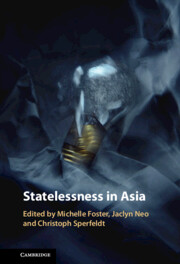Book contents
- Statelessness in Asia
- Statelessness in Asia
- Copyright page
- Contents
- Editor Bios
- Contributors
- Acknowledgements
- Notes on the Cover Image
- Abbreviations
- 1 Statelessness in Asia
- Part I Asia and the Phenomenon of Statelessness
- Part II Statelessness and Intersecting Vulnerabilities
- 6 Learning to Be Stateless
- 7 Gender, Nationality and Statelessness
- 8 Doubtful Citizens
- 9 Statelessness and Heritagization in Southeast Asia
- Part III Challenges and Prospects for Change
- Table of Legislation
- Table of Treaties
- Index
7 - Gender, Nationality and Statelessness
Marriage Migration to East Asia
from Part II - Statelessness and Intersecting Vulnerabilities
Published online by Cambridge University Press: 19 December 2024
- Statelessness in Asia
- Statelessness in Asia
- Copyright page
- Contents
- Editor Bios
- Contributors
- Acknowledgements
- Notes on the Cover Image
- Abbreviations
- 1 Statelessness in Asia
- Part I Asia and the Phenomenon of Statelessness
- Part II Statelessness and Intersecting Vulnerabilities
- 6 Learning to Be Stateless
- 7 Gender, Nationality and Statelessness
- 8 Doubtful Citizens
- 9 Statelessness and Heritagization in Southeast Asia
- Part III Challenges and Prospects for Change
- Table of Legislation
- Table of Treaties
- Index
Summary
This chapter focuses on the role of nationality laws in relation to marriage migration to South Korea (‘the Republic of Korea’ or ‘Korea’) and Taiwan (‘the Republic of China’) in manufacturing gendered nationality and statelessness. It illustrates how gender-based statelessness serves the interests of the ‘nation-state’ by excluding some female marriage migrants from membership of the nation. This is because nationality laws confer a status on those marriage migrants who advance the project of nation building by reversing falling birth rates. It argues that discriminatory nationality laws in Korea and Taiwan reflect traditional East Asian framings of nationality based on cultural and ethnic patriarchal lineage. The chapter demonstrates how laws and policies on nationality, in both Korea and Taiwan, both include and exclude the marriage migrant on the basis of gender, nationality, race, class, culture and ethnicity; it thereby exposes the causes of statelessness in the context of marriage migration. The chapter applies a construction of gender as based on power relations involving the state, social structures and individuals in the context of nationality laws in Korea and Taiwan.
- Type
- Chapter
- Information
- Statelessness in Asia , pp. 178 - 202Publisher: Cambridge University PressPrint publication year: 2025

